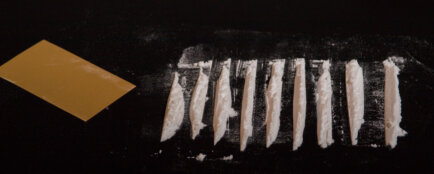What are drugs
Drugs or addictive substances have a plethora of different definitions. In general, they can be defined as addictive substances that, when they enter the body, affect the physiological or psychological functions of the body.
We can also use the definition of the law on addictive substances. The latter considers narcotic substances and psychotropic substances of natural or synthetic origin that have psychoactive effects and are also listed as addictive substances. It also includes solutions containing those substances, poppy, cannabis and coca bush, with the exception of cannabis, which contains no more than 1 % of substances in the tetrahydrocannabinol group.
Laws governing drugs
There are a number of laws and decrees which regulate drugs and their handling in some way. However, the main regulation is provided by the law on addictive substances and the Criminal Code.
The law on addictive substances
This law regulates a wide range of activities related to addictive and ancillary substances that can be abused to produce addictive substances. It specifically defines:
- Manufacturing: Rules and permits for the manufacture of addictive substances.
- Distribution: Regulation of the distribution of these substances, including storage and transportation.
- Sale: Licensing requirements and conditions for the sale of addictive substances.
- Use: Restrictions and conditions for the legal use of addictive substances, including for medical and scientific purposes.
Penal Code
ThePenal Code specifies drug-related offences and penalties, including:
- Production and possession: defining offences related to the production and possession of addictive substances.
- Distribution and trafficking: Penalties for illegal distribution and trafficking of drugs.
- Penalties: The range of penalties for different drug offences, from monetary fines to long-term imprisonment.
Are you solving a similar problem?
Have you been charged and prosecuted?
You will only succeed in court if your defence is bulletproof. We will conduct a careful analysis of the case and propose a course of action for the defence in a criminal trial in which we will vigorously enforce your rights.
I want to help
- When you order, you know what you will get and how much it will cost.
- We handle everything online or in person at one of our 6 offices.
- We handle 8 out of 10 requests within 2 working days.
- We have specialists for every field of law.
Legal highs and new drugs
Many drugs are legal in the Czech Republic, either traditionally (such as alcohol or tobacco products) or for practical reasons (e.g. in the form of diluents or medicines). In addition, some emerging substances, such as HHC, are also legal drugs. Although these are legal drugs, this does not mean that they are not regulated by local legislation.
We all know that alcohol, tobacco products, paint thinners or paints and varnishes cannot be sold to people under 18, and we also know that many medicines cannot be obtained without a prescription. However, there is a special group in the form of new drugs. These are often only legal because they are new and have not yet been banned. One of the most discussed new substances at the moment is HHC.
HHC
HHC stands for hexahydrocannabinol, a synthetic cannabinoid. It is a chemical compound similar to THC (tetrahydrocannabinol), the main psychoactive ingredient in cannabis. Like THC, HHC can affect mood, perception and behaviour. It first appeared on the Czech market around 2022 and was marketed as a legal alternative to conventional THC-containing marijuana.
HHC was formally sold as a collector’s item and was offered in many variations, as a refill for vapes or in the form of gummy bears. It quickly gained popularity, especially among children and adolescents. In fact, HHC was readily available even to minors. It could be bought in a number of vending machines selling cannabis products or simply on the internet without having to prove age.
It was not long before a number of cases emerged in which these people ended up in hospital after consuming HHC. In fact, if a person becomes hypersensitive or takes large amounts of HHC, they can develop disturbances of consciousness, convulsions, arrhythmias and breathing problems. In the worst cases, psychological changes (e.g. depression) may occur.
In light of these events, the Department of Health proposed earlier this year that HHC be added to the list of banned addictive substances. This was done on 6 March and HHC is therefore currently banned. However, a change is likely to take place soon. In May, the Psychomodulants Act was approved by the Chamber of Deputies and is expected to come into force on 1 January next year. HHC should be included in these substances and sales should be allowed again, but under strict conditions to prevent sales to children.
Illicit drugs and related offences
The Criminal Code regulates the issue of illegal drugs and related offences in a total of five areas:
Production and disposal of drugs
The Criminal Code provides that whoever unlawfully manufactures, imports, exports, transports, offers, brokers, sells or otherwise procures for another or possesses for another a narcotic or psychotropic substance, a preparation containing a narcotic or psychotropic substance, a precursor or a poison shall be punished by imprisonment for one to five years or a fine.
The offender faces more severe penalties if he or she acts as a member of an organised group, if the act is on a large scale or for a large benefit, if he or she has caused injury to health or death, or if the act was directed against a child under the age of 15. In total, the offender can be sentenced to up to 18 years’ imprisonment.
Possession of drugs
The Criminal Code states that a person who unlawfully possesses for his or her own use more than a small quantity (to be judged on an individual basis) of the narcotic substance cannabis, cannabis resin or a psychotropic substance containing tetrahydrocannabinol (THC) and its variants may be punished by imprisonment for up to one year, prohibition of activity or confiscation of property.
Other (harder) drugs are punishable by up to two years’ imprisonment, prohibition of activity and confiscation of property. Furthermore, the amount of the penalty is escalated according to the extent of the offence up to 8 years’ imprisonment.
Cultivation of drugs
Anyone who unlawfully cultivates cannabis plants for his own use in quantities greater than small can be punished by up to six months’ imprisonment, a fine or forfeiture of property. In the case of mushrooms or other plants containing a narcotic or psychotropic substance, the penalty is imprisonment for up to one year, a fine or forfeiture of the property. Up to three years can be given if the cultivation is on a large scale and up to five years if it is on a significant scale.
Manufacture of drugs and possession of an article for the manufacture of drugs
Whoever manufactures, procures for himself or another a drug or possesses an object intended for the manufacture of drugs may be punished by imprisonment for up to five years, a fine, prohibition of activity or forfeiture of property. He or she may be sentenced to a term of imprisonment of between 2 and 10 years if he or she acts as a member of an organised group, commits the offence on a large scale, acts on a large scale towards a child or if he or she has received a substantial benefit.
Dissemination of drug addiction
Anyone who entices, encourages, incites or otherwise spreads the abuse of an addictive substance (except alcohol) may be sentenced to up to three years’ imprisonment or a ban on activity.
Summary
Drugs are regulated by the Addictive Substances Act, which regulates their production, distribution, sale and use. Penalties are then laid down in the Penal Code. Even legal drugs such as alcohol, tobacco and some emerging substances are subject to regulation to minimise the risks of abuse. With regard to illicit drugs, the possession of more than small quantities for personal use, their cultivation, production, disposal and dissemination are criminal offences in this country.




